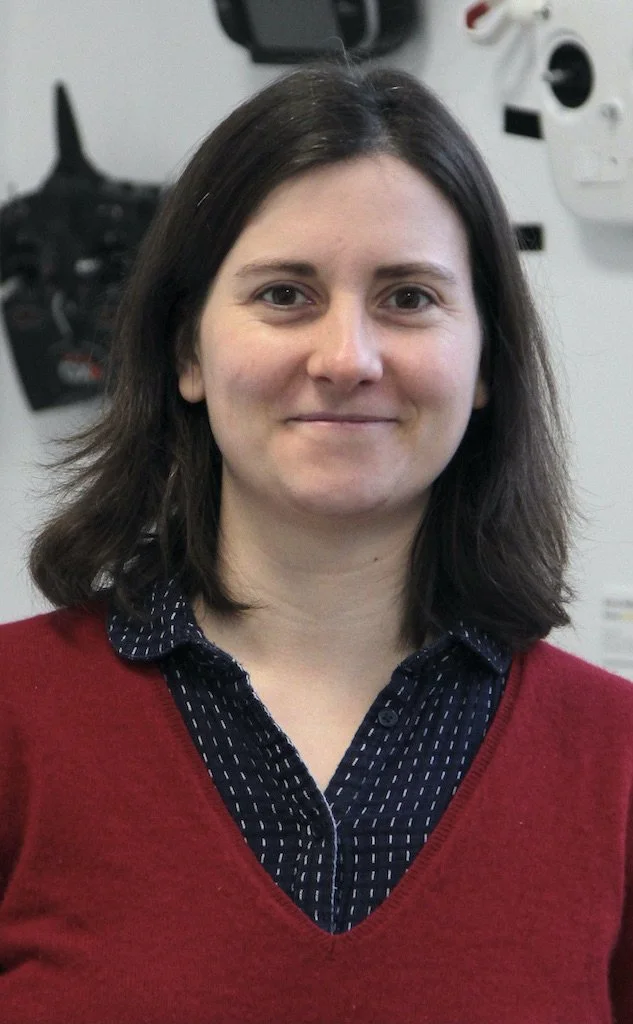Céline Craye
Céline with some of the drones that Cerbair’s anti-drone system have brought down. Photo credit: Christina Mackenzie
“Now I understand why my mother warned me that the birth of one’s first child leads many women to throw in the professional towel,” smiles Céline, mother of Théodore, who is just a few months old, and head of the software development team at Cerbair, which supplies governments with anti-drone solutions. She admits that becoming a mother has changed her relationship to work, adding that she finds it exhausting to start a second day once the office day (or, for the moment, home-working day) is over, even if her spouse fully plays his part.
Nevertheless, like her mother, she will hang on in there. “Both my parents are engineers who work in technology; I think that's why, even as a small child, I always wanted to do maths and physics.”
““What I liked in a start-up is that my work directly impacts the product, whereas in a large group like Thales I was working in a laboratory and my work wouldn’t have had an impact on products for years… if ever!””
A good student at school in the Paris region, Céline saw herself more as a researcher than an engineer. “I didn't particularly want to be an engineer, in fact even today I would be hard pushed to say what an engineer is,” she remarks. However, rather than embarking on university studies, she undertook the arduous "prep" route. Unique to France (as far as I’m aware) this consists of taking the best students in the country, placing them in the limited number of lycées in the country that offer the course, and making them work for two years, harder than they ever will again, on maths and physics, to prepare for the entrance exams to the Grandes Ecoles (see glossary). She thoroughly disliked the course but concedes it is “extremely good training.”
Admitted to Télécom Bretagne (now IMT Atlantique), she approached the course somewhat anxiously because “there was a lot of programming, of which I had done zero, and what interested me above all was physics. Then I realized that you can learn programming very easily: it's a bit like building with Lego blocks and I got hooked!”
In 2011, at the end of her second year, she took a gap year to go to Canada for an internship at the National Institute of Optics in Quebec. “I hadn't realized how different Quebecois is from French; for the first few months I’d be exhausted by the end of the day from trying to understand what people were saying!” she laughs.
She returned to France to finish her studies, but, having tasted life in Canada she didn’t hesitate to jump on the first plane when, in the middle of her third year at Télécom Bretagne she was offered a research project in Ontario to do a Masters in Applied Sciences. This time she was accompanied by her spouse, met on the benches of Telecom Bretagne. “I was at the University of Waterloo, in the eponymous town [halfway between Toronto and Detroit in the USA] which basically consists of a few long, wide and somewhat empty streets with a Walmart at one end, the campus with over 40,000 students and that's about it! That’s really why after two years we returned to France,” she explains. At first she’d worried that she wouldn’t understand the classes, given in English, but was pleasantly surprised to have no problems. And it was in Waterloo that she began to work on artificial intelligence, a subject of great interest to Thales which contracted her as soon as she returned to France as a doctoral student to work on artificial intelligence applied to robotics.
She defended her thesis “Intrinsic motivation mechanisms for incremental learning of visual saliency” in April 2017 and Thales hired her in the wake. It was only a few months later that she was contacted by the start-up Cerbair, which was looking for people specialized in artificial intelligence to develop their anti-drone system. This system interrupts communication between the pilot and the drone, rendering the drone inoperative. “What I liked in a start-up is that my work directly impacts the product, whereas in a large group like Thales I was working in a laboratory and my work wouldn’t have had an impact on products for years… if ever!”
As Cerbair's anti-drone system is aimed at the military and police, the startup has hired a number of ex-military personnel. Celine admits that their lunchtime discussions about their past military operations don't interest her much. “The military part isn’t what I like the most. What I enjoy is the science and having a real impact to help people,” she says.
Very discreet, this calm, composed young woman fails to point out that she and her colleague Salem Ardjoune won the competition to detect and differentiate a drone amongst birds organized by the IEEE (Institute of Electrical and Electronics Engineers) in 2019 during the 16th International Conference on Advanced Video and Signal Based Surveillance (AVSS) against other teams of researchers from Australia, Belgium, Germany, Great Britain, Greece, Italy, Romania and Spain!




